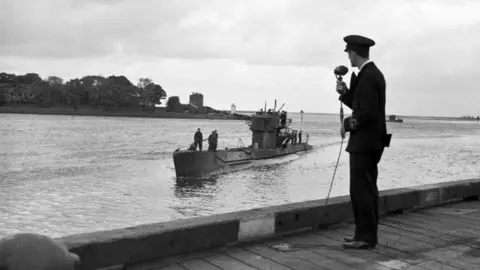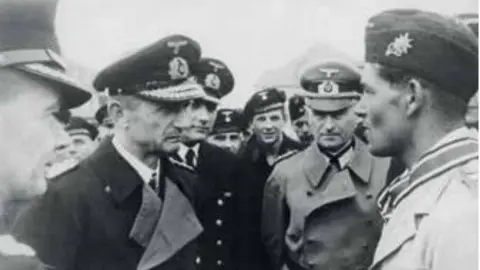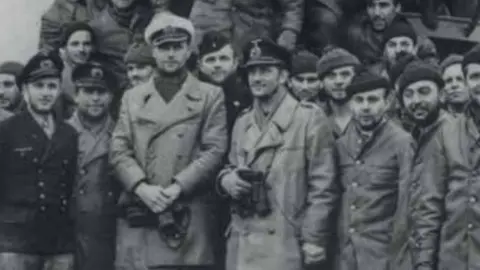The German U-boats surrendered 'yards from our house'
 BBC
BBCOn 14 May 1945, almost a week after Britain and its allies celebrated victory in Europe, Hitler's defeated Atlantic U-boats berthed for the final time.
The German submarines – the "U-boat peril" as Churchill had called them - had been the Allies' principal threat at sea during the Battle of the Atlantic, a campaign that raged throughout the war.
On that day, the first of the U-boats made their way up the River Foyle to Lisahally in County Londonderry to formally surrender.
Eighty years on, Bert Whoriskey, then just 14, and who watched the surrender, told BBC News NI it is a day he can "never ever forget".
'The war had ended, excitement was second to none'
"The war had ended, excitement was second to none, " he said.
"There were ships of of all kinds, and at their head a big Navy destroyer, and there they were coming up the Foyle.
"The U-boats were following, around eight, or 10 of them, and they berthed about 200 yards from our house."

Pre-war, Lisahally had been a quiet hamlet on the shores of the River Foyle.
It was home to about 20 families, mainly workers at a manure factory, whose homes had been built by the factory owners.
"All we had was a nice cricket pitch, and a pavilion – that was Lisahally until 1939 when Hitler decided it was time to have a war," Bert said.
Within months, Lisahally, as well as the city of Derry, and the wider north west of Northern Ireland, would be transformed. Lisahally would become one of the Allies' most strategically important ports.
Vast amounts of timber arrived, stretched out across Bert's childhood cricket pitch, along with US Naval Construction Battalions (Seabees).
Work began, and continued day and night for months.
A huge jetty was built at the "back of our house," he said.
Then the Royal Air Force arrived.
Huge oil storage facilities were built nearby, an airfield too.
Barrage balloons arrived, surrounding the area to protect it from air strike.
'Lisahally was ready'
Never had then nine-year-old Bert "seen anything as big".
"When that was all built you just looked at it, Lisahally was ready," said Bert.
Soon, he said, the ships started to arrive.
"Destroyers, battleships submarines, they all came to refuel and rearm. There was British, Canadian, American, Australian, Dutch. This went on every day for the rest of the war," Bert said.
 Derry City and Strabane District Council Archive Collection
Derry City and Strabane District Council Archive CollectionThe naval base - shared by the Royal Navy, the Royal Canadian Navy and the United States Navy - was vital to the protection of convoys in the Atlantic.
At one time, 140 Allied escort ships were based on the River Foyle, and Londonderry was home to Base One Europe, the US Navy's operating base in Northern Ireland.
The Battle of Atlantic was the longest continuous military campaign of World War Two.
More than 66,000 Allied merchant seamen, sailors and airmen died, with 175 Allied warships and 5,000 merchant ships destroyed by German U-boats.
'They paid the ultimate price'
As months gave way to years, Bert said, "you could see the the price that was being paid for where we are today".
"The ships were coming in damaged. They would have let us on every once in a while. The young men who were crewing the ship, you could see in their faces they were terrified," he said.
"Nearly every day there would be bodies on the jetty, waiting to be taken away. That always comes back into my dreams, the bodies on the jetty getting put into the back of a lorry - people who paid the ultimate price."
When victory in Europe finally came, Bert remembers sailors jumping into the Foyle "because they were so excited".
A "big announcement" came in the days that followed, he said.
"They announced the U-boats fighting at our end of the Atlantic were surrendering at Lisahally," he said.
On 14 May the first of the U-boats berthed at Lisahally and formally ordered to surrender by Admiral Sir Max Horton, commander-in-chief, Western Approaches.
"Of all the things that happened, all the things we had seen, this was the biggest of them all," Bert said.
"We were only young. All we thought was we had spent six years fighting the Germans, and now we were going to see actual real Germans," Bert said.
 Derry City and Strabane District Council Archive Collection
Derry City and Strabane District Council Archive CollectionBert and his pals had to wait until "all the pomp died down".
"The first thing we heard was the singing of marching tunes.
"When we looked at them and I will never forget, they were all very young. Not many of them were even as old as 30.
"You could tell they were glad the war was over, they knew they had survived."
The German submariners were held at the naval base for about a year and Bert and his friends used to go down and look through the fence.
"One day they were all on their knees in a big line, we thought they were going to be shot," Bert said.
"What they were doing was pulling the grass out of the ground to make a football pitch – the next day a goalpost was put up.
"We spent time marching up and down with them. They made us toys at Christmas, they made a toy double decker bus – I had never seen a double decker bus."

Derry's strategic importance can not be underestimated, Admiral Lord West of Spithead, the First Sea Lord and Chief of the Naval Staff from 2002 to 2006, said.
"It was absolutely crucial and we needed to get our ships and facilities as far to the west as we could," he told BBC Radio Ulster's Good Morning Ulster programme.
"It was wonderful that we could use the base up in Londonderry which put our ships a bit closer."
The U-boats were deliberately sunk - or scuttled - off the coast of Derry and Donegal after the war.
A special event to commemorate the city's wartime role is set to take place in Derry's Ebrington Square on 17 May.
